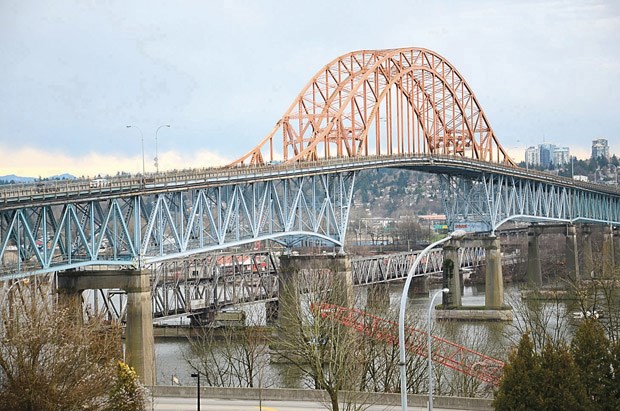Will traffic congestion on New West streets improve when tolls are eliminated on the Port Mann Bridge next week? We shall soon see.
The provincial government has announced that motorists in the Lower Mainland will no longer have to pay tolls on the Port Mann and Golden Ears bridges, effective Sept. 1.
“I do expect in the short term that there will be some reduction in the amount of traffic using the Pattullo Bridge, and that will have positive impacts in the short term for congestion during rush hour in New West,” said Coun. Patrick Johnstone. “In the long term, I think we need to think about regional road pricing, we need to think about more secure funding for alternatives to transportation. This is going to be a short-term gain, but the long-term gain is going to rely on having a better regional road or transportation funding system.”
When tolls were introduced on the Port Mann Bridge, the City of New Westminster voiced concerns that many motorists began taking the free Pattullo Bridge instead.
According to the provincial government, about 121,000 vehicles travel across the Port Mann Bridge and 40,000 vehicles take the Golden Ears Bridge each day.
“Many people have been travelling out of their way to avoid tolls because they simply cannot afford them,” Premier John Horgan said in a press release. “Getting rid of tolls will shorten commute times and clear up other routes, so people can spend less time stuck in traffic and more time with their families.”
While the decision to eliminate bridge tolls is good news for motorists’ pocketbooks, the province recognizes it will have an impact on provincial coffers:
* Removing tolls from the two bridges will cost the province an additional $132 million for the remainder of the fiscal year ($94 million for the Port Mann Bridge and $38 million for the Golden Ears Bridge). This includes an estimated $12 million to wind down tolling operations for both bridges.
* For the next few years, it will cost an additional $135 million annually to cover lost tolling revenue on the Port Mann Bridge, which includes $25 million that will be saved annually by no longer having to collect tolls.
* The province is working with TransLink, which owns and operates the Golden Ears Bridge, on a long-term funding agreement for future years.
“The tolls that existed on the bridges weren’t paying for the long-term transportation investments of the mayors’ plan. That was never really the plan,” Johnstone said. “Now, the mayors’ plan does talk about, after at the end of the first 10 years, having some kind of regional road-pricing model or some other model to provide long-term funding. Again, I think the government is committed to supporting that.”
Johnstone, who firmly believes the region needs to create secure funding for transportation, said road pricing is a model that’s worked well in other regions.
“It is not a new idea, but we need to think about paying for our transportation infrastructure regionwide,” he said. “It’s not just about paying for roads and bridges, it’s about paying for our transit system and the other alternatives.”
During the spring provincial election campaign, the B.C. Liberals promised to cap bridge tolls at $500 a year and the NDP pledged to slash tolls on the Port Mann and Golden Ears bridges.
Jonina Campbell, the Green party candidate in New Westminster, said the NDP government’s announcement was about following up on an election promise that was more about winning seats in Surrey and the Fraser Valley than it was about good, evidence-based traffic demand management.
“The key in all of this is, where is the data that supports this decision? Where is the evidence that says this is good transportation demand management and it’s just not populist politics?” she said. “That is what I want to see. I am not saying it’s not a consideration, I just don’t see the evidence that this is the best way to go, for New Westminster especially.”
Campbell said she would have preferred the government laid out a clear plan on how it’s going to recuperate the money lost from tolls and pay for future projects, and manage traffic in the region. While she suspects there will be a short-term “honeymoon period” in New West where motorists who have been using the Pattullo start taking the Port Mann, she said removal of the tolls could result in more people driving – and more cars on the road.
“The main concern for us in New West is, how does this decision affect traffic in New West? Congestion is a quality of life issue. It is a significant issue for the people of New Westminster,” she said. “I think when we look at making decisions we have to make sure that the number one goal is reducing the number of people on the road. It’s better for people and it’s better for the environment. I think that tolls and road pricing are tools that allow us to manage our transportation systems well.”
The provincial government states that families who regularly have to cross the Fraser River will save an average of $1,500 a year, while commercial drivers averaging one crossing a day will save $4,500 or more annually.
“We are going to have to pay for it in one way or another. The first one which Horgan has said will happen, is they are going to add it to the provincial taxpayer-supported debt. By eliminating tolls, we just shift that burden now onto our taxpayer debt. That raises our interest on the debt, which means there is less money to invest in other things like child care and health care,” Campbell said. “It’s just moving things around.”



